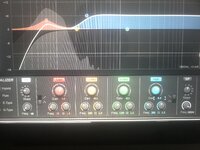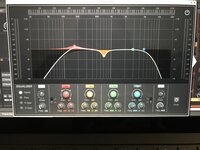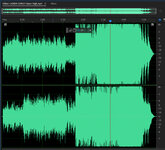No criticism intended but while I don't like the genre personally, I've had to work with it lots - and there's a big difference in cross timing and poor timing. It's very, very loose which robs it of the urgency and killer feel.
When I say processed I mean that it's compressed to hell, squashed and is a solid wall of sound that hides virtually all the cleverer bits audible in the 'pre-mastered' example.
I think we may be using the word mastering in a totally different sense. Mastering is often doing a lot but transparently - it's bringing out some bits, it's pushing back others, it's adding a bit of sparkle or tightening a kick or snare sound, plus in this modern age, it's making hot sound louder and fuller. If you do your mix, then my question is why are you not doing this while you're mixing. Experimenting with compression on the drums and bass, and making them sit right? In yours the drums sound like they are recorded in a very live, but dull room, and the overall impression is lack of clarity and too far away mics. Then in your mastering they get mangled out of all existence.
I said I hate the genre and that's true, but I'd be listening to the kick and snare and EQ'ing them very carefully to make them drive the song - perhaps then adding some rocky reverb to the snare - maybe a slapjack, or reverb tail or the dreaded gated tail. Then I'd be looking at the bass guitar and making sure it was separated from the kick. Then the toms - then the metalwork. I'd probably group these all up with their separate effects and reduce the fader count. The guitar seems to be two distinct sections, the less distorted one and then the hit them in the face sound - but in the unmastered version the guitar is kind of odd sounding. If I did it, the entire song would stand up on it's own, and then the mastering would be far, far more gentle - mastering is the polish, the icing on the cake, the final sparkle. In your case, it's just brute force. Often when you send your work to a dedicated mastering house, you hear a better track, but really have to A/B to hear exactly what has changed - yours are chalk and cheese. Like a preset where everything is set to maximum and simply turned on.
The clash in rhythm between guitar is definitely a negative. When you work with great drummers they can play the most weird things and all the instruments still lock in and it works. Sadly, the drummer I think hasn't quite got that skill yet - so he's trying what he hears others do, but it misses. When you analyse these disrythmic parts in the big name bands and put them on a grid you can see where they are different but also where the list beat of a phrase ties up with the notes the guitar, bass or keys parts also hit.
The thing to remember is that liking a genre is not important when you talk about music. It's a common language and in yours the guitar has a repeat delay - which gives the listener a tempo - but when the percussion starts the drum tempo, which is the song tempo is different, so there's a musical 'lurch'. The solution is a click, and then alignment of the guitar delay to match the tempo. Once you get to the 4 minute mark, everything is is really loose, timing wise. The individual rhythms are great - but it's a fight as to who is the anchor. usually it's bass and drums that lock up, but it's a battle here.
PS - still like the unmastered version better - it's far nicer to listen to, although I understand you want the power of the mastered version - but there are so many nice touches in the original that get wiped out by whatever mangling that plug in does.

 I cut the bass lows and guitars lows 70 and 100 hearts respectively.
I cut the bass lows and guitars lows 70 and 100 hearts respectively. 


